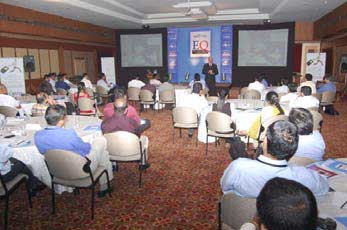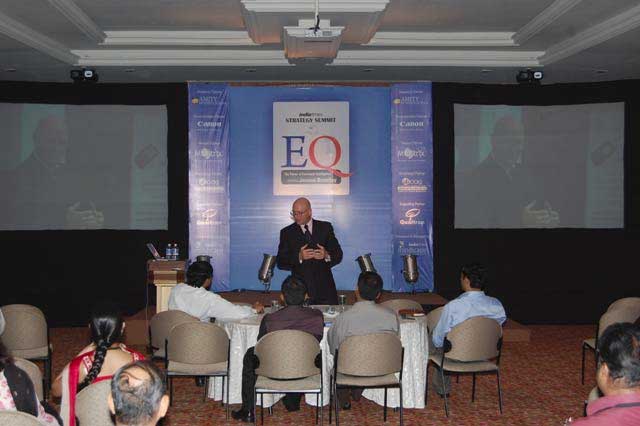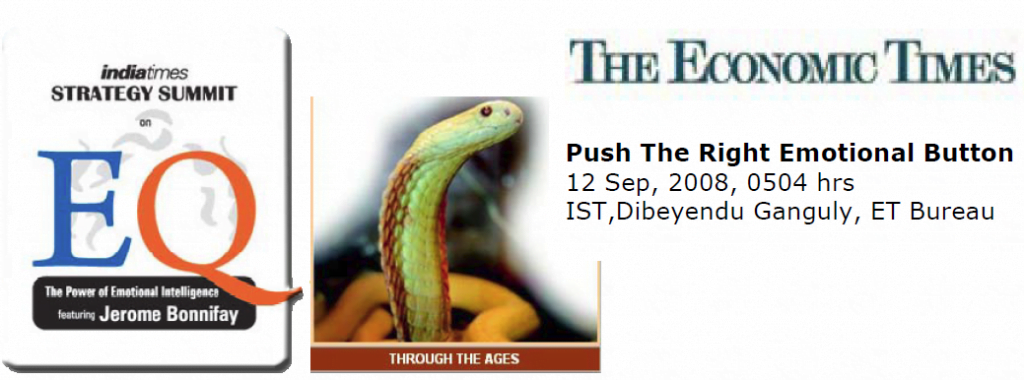EI: THE POWER OF EMOTIONAL INTELLIGENCE
CERTIFICATION
• HBDI TM
Herrmann Brain Dominance Indicator
• YAPDI TM
Young Adults Brain Dominance Indicator
• CREDO PERSONALITY PROFILING
(CPP)


Emotional intelligence is a key factor to enhancing your quality of work & life
Peter Salovey , a Yale psychologist, has identified 5 Domains of Emotional Intelligence
| Self Awareness | Recognizing a feeling as it occurs |
| Managing One’s Emotions | The capacity to soothe oneself, to shake off rampant anxiety , gloom or irritability |
| Motivating Oneself | Being able to call up feelings of optimism , confidence and enthusiasm |
| Recognizing Emotions in Others | Empathy , being attuned to the subtle social signals that indicate what others need or want |
| Handling Relationships | Being able to set a positive tone of co-operation even when events are not going smoothly . One need only ask the questions , “Why is this important?” or, “What happens if you are not good at this ?” to determine the impact and importance of these emotional intelligence skills in our professional and personal live s. In our business environments , we harbor some myths about emotions that can keep us from being open to the possibilities and opportunities that emotional intelligence has to offer. |
Program Objectives
- To understand the concept of awareness of self and others.
- Achievement of better levels of competitiveness.
- Overall enhanced productivity.
- Enhanced self-confidence and self-empowerment.
- Positive interactions by building rapport, trust and credibility.
- Increased success and reduces stress on the job.
- Successful business relationships
Delivery Methodologies
This course presents a model of self-directed learning, which takes participants beyond the threshold of intellectual understanding into the realm of behavior change and the benefits of self-discovery.
Experiential Learning style will take center stage in this 2-day programme. Other learning styles will include :
|
|
Programme Contents
- EQ & IQ
- How emotion works
- Emotional at the workplace
- Metabolism , Stress Factors & Symptom s
- Motivations
- Decision making
- Communication & Interpersonal Skills Effectiveness
- Getting Control & Learning About Emotions
Pre Assessments
HBDI Profiling Tool: In profiling the middle and senior managers, their personal thinking preference, behavioral preference and potential development opportunities will be made visible. The HBDI, or the Herrmann Brain Dominance Instrument, is an instrument which measures thinking preferences. It is one of the most powerful and most flexible diagnostic tools available. World-wide, people are taking the instrument and integrating it into their own spheres of training, development, human resource and organization development.
Leadership Competency Assessment: A leadership criteria indices based assessment will be administered via a set of questionnaires. This assessment will allow us to accurately pin-point areas for development and areas of strengths as part of the talent and succession planning process. The criteria indices are made up of leadership competencies and core values which in turn is associated to 3 critical competency areas: Business Acumen, People Development & Decision Making.
Why do people instinctively wince when they get a call from their boss – even if he’s a nice guy who has never done the many harm ? The explanation lies in the ways our brain are wired says Jerome Bonnifay and it has nothing to do whether your boss is a nice guy or not. “Your brain’s job is to protect you, “says the founder CEO of HR consulting firm SBIC Services, “and it’s automatically wary of a person in authority who has the potential to hurt you.”
Which is why Bonnifay’s workshops always feature a snake. After all, if you can learn to get comfortable with a reptile that’s been a source of fear to the human species since time immemorial, what’s a boss? “The snake provides shock value, its cares people, “says Bonnifay, who intends to use it in a series of four seminars he’s conducting for India Times later this month. “But by the end of the day, they get over their fear and actually learn to manipulate the snake to do what they want.”
These kind of dramatic tactics have served to make Bonnifay a popular management speaker world-wide. He’s a global authority on Emotional Intelligence (EI), which he unabashedly describes as the art and science of manipulating others to do what you want. “We know that the best way to get people to do something is to make them actually want to d o it, “he says. “I teach people about the buttons they need to push to make this possible .”
Since it came in vogue some 20 years ago, EI has been the subject of some serious scientific and unscientific research and like any popular concept, it’s had its share of critics. Some say it’s too broad a term, impossible to measure accurately. Others refuse to recognize it as a form of intelligence at all and say it’s just a skill. Which suits Bonnifay just fine as he says, “I vulgarise EI and EQ to everyone’s level, so the can get something out of it.”
This Frenchman obviously doesn’t believe in obfuscation when it comes to choosing his words and it probably has something to do with the fact that he ‘s lived all over the world. Bonnifay spent six years in Delhi as a child in the 60s, when the French government sent his father to India to work on the country ‘s oil and gas programme . He later returned to France and graduated from the University of Poitiers and then moved on to d o his MBA from the Frederick Taylor University, California.
In 1993, he started SBIC Services in Kuala Lumpur, where he now lives. “One of my life goals was to settle in Asia. Most of my early work was between Australia and China and I finally ended up settling in Malaysia because it is a business hub for South East Asia,” he says.
Bonnifay is a bit of an EI evangelist, saying, “It is the single element that can allow you to outshine colleagues. It’s no use having high IQ if you can’t communicate it. And EI is not something people are born with. It can be learnt, it can be polished. Emotions come from the brain, not from the heart, as some people like to say. If you can influence the emotions of your clients, your colleagues or subordinates or boss, you can get them to do what you want.” While it’s useful in dealing with your immediate circle, EI really comes into play when you’re dealing with someone who is different and doesn’t speak the same language – an increasingly common situation in today ‘s globalised business scenario.
“If I’m an accountant speaking to another accountant, it is easy , “says Bonnifay. “But when an accountant communicates with a painter, EI is required, otherwise they will not understand each other.” Quite often, this means being able to make small talk before getting down to the business at hand . For example, in connecting with someone on the phone , those who successfully manage to engage in some conversational banter before getting to the point are usually those with high EI and they are at an advantage over those who don’t know how. “Small talk is part of building personal relationships and it always helps business,” says Bonnifay.
Some cultures nurture high EI in people so they connect with other cultures naturally. Others are only recently waking up to the importance of EI. China, for example, was considered inscrutable by the rest of the world till recently. Says Bonnifay, “The Chinese were not too bothered about EI till around ten years ago. They didn’t talk about individuals, they always talked about community.”
Meanwhile, recognising its importance, global corporates are now incorporating EQ tests into their recruitment and trying to improve EQ in those already recruited. Bonnifay has been a consultant to several such companies and says, “L’Oreal and Starbucks are two companies which implement EI measures thoroughly.
An insurance company recently did a five year survey among their sales staff to co-relate their performance with EQ and found that a strong co-relation exists.” It should be no surprise then that those in sales are the biggest believers in EI training. While in the field, they’re the ones who get all-too-frequent calls from their bosses and at Bonnifay’s seminars, they’re the ones who get to make friends with the snake.

